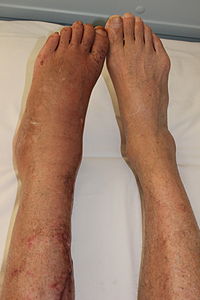
Photo from wikipedia
INTRODUCTION Complex regional pain syndrome (CRPS) is a neurological pain disorder that is challenging to diagnose and manage, resulting in increased morbidity and costs. It most commonly occurs following traumatic… Click to show full abstract
INTRODUCTION Complex regional pain syndrome (CRPS) is a neurological pain disorder that is challenging to diagnose and manage, resulting in increased morbidity and costs. It most commonly occurs following traumatic injury, such as a fracture, crush injury or surgery. Recent research has evaluated the efficacy of treatments which have contradicted previous hypotheses. This systematic review summarizes these findings to improve clinician's decision-making. SOURCES OF DATA A comprehensive search of PubMed, MEDLINE and Embase databases from inception through January 2021 was performed in accordance with Preferred Reporting Items for Systematic Reviews and Meta-Analyses (PRISMA) guidelines. Two reviewers independently screened relevant articles discussing the management of CRPS in adult trauma patients. All prospective and retrospective studies, non-randomized comparison studies and case series were considered for inclusion. Data extraction was performed by populating a predefined data abstraction sheet. AREAS OF AGREEMENT There is strong evidence to suggest the efficacy of prompt physiotherapy, lidocaine, ketamine, bisphosphonates, sympathectomy and brachial plexus blocks in the management of CRPS. AREAS OF CONTROVERSY The latest evidence suggests that vitamin C has no significant role to play in the treatment or prevention of CRPS. GROWING POINTS A multidisciplinary team approach and early diagnosis are imperative for successful treatment of CRPS. The Budapest criteria and the British Orthopaedic Association Standards for Trauma and Orthopaedics (BOAST) guidelines should be used when diagnosing CRPS. There is currently no clear evidence of superiority in any treatment. AREAS TIMELY FOR DEVELOPING RESEARCH There are few high-quality studies that inform the best treatment modalities for CRPS. Though emerging treatments show promise, further research is needed.
Journal Title: British medical bulletin
Year Published: 2023
Link to full text (if available)
Share on Social Media: Sign Up to like & get
recommendations!